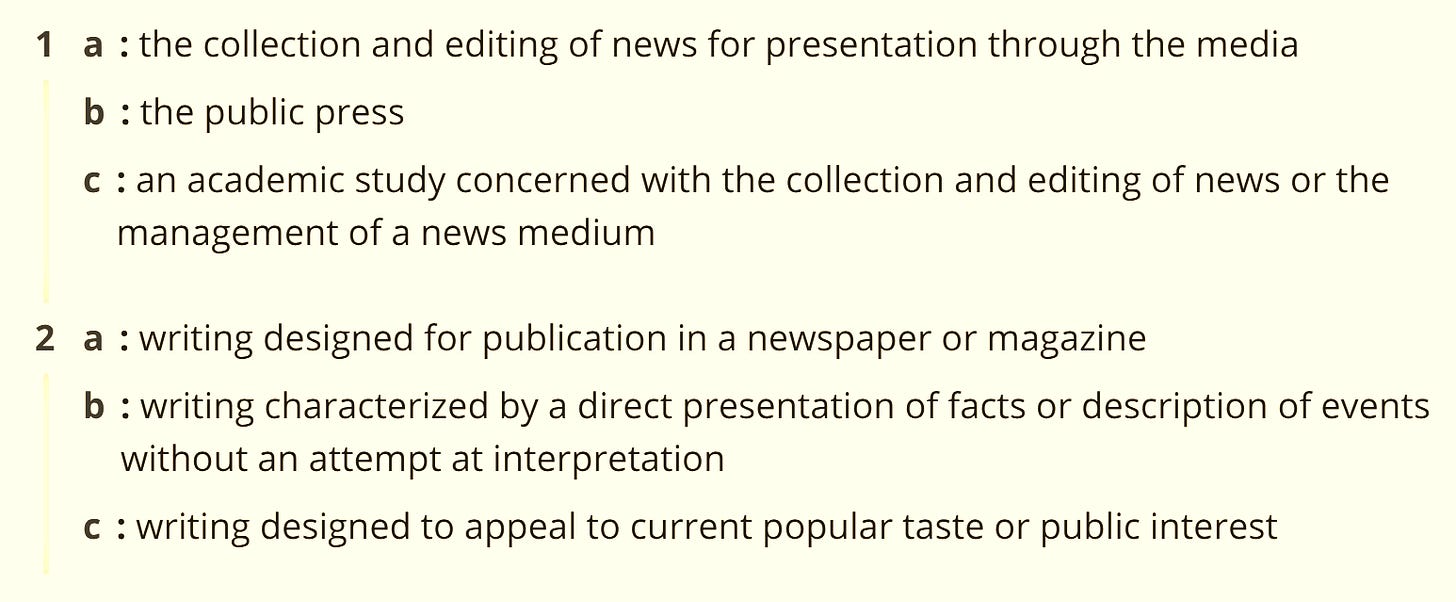A Week in the Life of a Wine Journalist
Spoiler: It wasn't wandering around vineyards sipping and spitting
I am never entirely sure what to call myself. Usually I settle on the term ‘writer’. I’m definitely not a wine critic - scores and tasting notes aren’t my favoured tools. The term ‘journalist’ always felt a bit too aspirational. Journalism makes me think of correspondents in war-torn countries or advocates who spend years investigating a scandal that could affect millions.
But journalism can take many forms. It’s not always life and death. Here’s a definition from wikipedia:
A journalist is a person who gathers information in the form of text, audio or pictures, processes it into a newsworthy form and disseminates it to the public.
Here’s a more general definition of journalism from Merriam-Webster:
Most of this seems like a fair description of my work. So Wine Journalist it is.
What do you think I do all day?
When I tell people my job is writing about wine, they usually make some kind of joke that it must be great to drink for a living. There’s a popular notion that wine hacks spend their whole lives boozing while visiting bucolic wine regions.
I’m not going to say it’s a terrible life. I love wine and travel and I get to visit some beautiful parts of the world in the name of work. But this is only a small part of the day job. The remainder comprises hours hunched over a laptop, writing in solitude.
And sometimes, dealing with negative feedback from your previous work.
About that so-called ‘journalism’: a large proportion of wine writing today is little more than straight-up promotion or marketing. Here are some typical formulas:
Wine writer is invited on a press trip organised by a generic body (usually a region) and has a jolly good time at the region’s expense. A ‘puff piece’, aka a regional profile, usually results. “Region x used to be obscure/forgotten/down on its luck/a source of only plonk but now times are changing and it has upped its game” is the standard journalistic hook.
A ‘listicle’ along the lines of “The 25 palest rosés you must drink this summer” or “Our top ten red wines from the Douro producers with the most advertising dollars to spend”.
Wine writer visits/is wined and dined by iconic/eccentric/iconoclastic producer x and has a jolly good time at the producer’s expense. The result: “producer x is the region’s brightest star/most promising talent/unique artisan.” You get the idea.
I’ve written all of these pieces on multiple occasions over the years. I’ll probably write them again if someone offers me enough money. But at some point it gets pretty tedious. And I’m not convinced it does the wine world much good, because none of these formulas allows for genuine criticism.
No news unless it’s good news
Why not, you ask? Why would you bite the hand that feeds? Virtually all wine critics/writers/journalists rely on trips and hospitality funded by producers. It creates a nice cosy community where few will step out of line or publish a negative review. Compare this with the world of restaurant or film reviews if you want to understand the difference.
I’ve always aspired to a more journalistic and critical style of writing. But there are weeks when I deeply regret that decision. And this is one of them. I spent the last few days knee-deep in the fallout from my previous work.
Right now I’m contesting a request to take down one article, and troubleshooting how I can best give the right to reply for another. These and other similar cases often unfold into endless email threads, uncomfortable phone calls and panic requests to colleagues to seek advice. There’s a lot of agonising over words, in an attempt to minimise offence, further issues or even potential legal actions.
Then there was my last wine guide, where I tried to be as inclusive and fair as possible, including every grower in the region who met my published standards. Apparently it was a poor decision. I have been told that I don’t understand orange wine, or natural wine, that I invited the wrong tasters and that I included the wrong producers. Maybe I’ll just start reviewing supermarket wines. It might be easier.
I don’t expect sympathy - there are no dead horse’s heads on my bed, or death threats hitting my inbox. But I’m not especially thick-skinned, so all of these situations cause considerable stress and distraction. It’s not war reporting, but words still hurt. “The pen is mightier than the sword” said author Edward Bulwer-Lytton in 1839. And those who feel injured by my pen can be quite forthright.
So this week, instead of writing that viral article that was going to make me rich and famous and have you laughing in the aisles, I’ve spent my time worrying about what other people think, and considering my ethical duty as a journalist.
My apologies to all my subscribers. Let’s hope next week is a bit less of a shit show.




Tough time for standing up for what you believe in. As ever you have my support and respect Simon, I wish you well in navigating a troubled period. But stay strong
I have a solution. The art world has a "Banksy" you could be the "Banksy" of the wine world. Write an obit for yourself, go underground, reemerge under a nom de plume and start anew. Kidding aside, don't take down your article. Revise something factually wrong, but if someone didn't like your opinion they can leave their comments below as I am doing now. If a producer wasn't included in your review, shame on them. They need to do better at marketing themselves to not be forgotten the next time. I was on both sides of these headaches for 25 years and I can tell you I respected the journalists who didn't oblige requests whether I agreed with them or not.